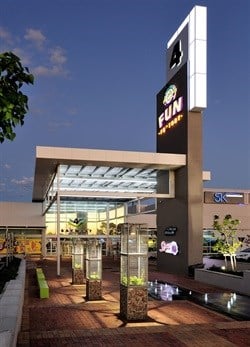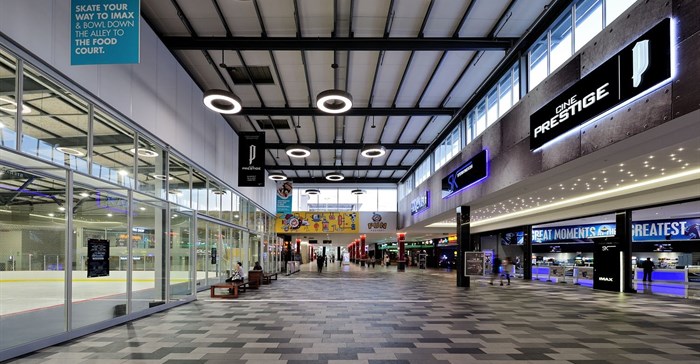How do you sell something that doesn't yet exist? How do you sell something you can't see? How do you sell something that you cannot touch, hear, smell or feel?
When it comes to a commercial development and getting investment and buy-in – this is the position developers find themselves in from a brand perspective.
Take a shopping mall for the purpose of example. When it comes to decision making, shoppers rely on various levels of the five senses. Each of these senses plays an important part in convincing us whether something is good or bad, whether we like it or not, or if it is familiar or strange. Without our senses, we have no frame of reference in which to evaluate our choices. What does the thing you want to sell, look like? What does it feel like and, probably most importantly, how does it make you feel?

Baywest Mall © Wieland Gleich
When Abacus Asset Management and the Billion Group decided to develop Baywest Mall, the biggest mall in the Eastern Cape, they were faced with the task of selling something to the sceptical shoppers of Nelson Mandela Bay that did not yet exist. It was an idea of a shopping mall that would inspire customers, by providing consumers with every shopping desire under one roof, and in doing so become the prime shopping destination in Nelson Mandela Bay. But what did this idea look like? What did it feel like?
To bring this idea to life and win over the consumer, you need a partner who can creatively see the possibility a development can offer the community in which it will sit. And then create a brand that accurately brings something intangible, to life in a tangible way. In short, the brand identity of Baywest Mall had to communicate efficiently its offering,
A brand is more than a logo – a brand is the sum of your organisation’s awareness and reputation in the market, as well as a customer’s experience. A brand has both functional and emotional elements which create a relationship between your clients (in this case shoppers), staff, community, and the organisations offering. It’s not a marketing strategy; it’s the positioning and communication platform for an organisation to be brought to life – it’s who they are and what they say.
The first rule in creating a brand is that it must be believable. Baywest Mall set out to inspire the vibrant side of society. When a brand communicates with its audience, it needs to be honest and deliver on its promises. Otherwise, it will fail. The second rule in brand creation is that it must be relatable if you want ‘buy-in’ from the intended audience. Will the shopper relate to the proposed tenant mix under one roof at this prime shopping destination in Nelson Mandela Bay? The third rule in creating a brand is that it must be identifiable. It is pointless to create something only to have it not recognised or understood by the intended audience.
We could look at the brand creation of Baywest Mall as a courtship between a developer and the shopper. Research into the wants and needs of shoppers highlighted where the brand should position itself to best be received. Little surprises and hints at experiences to be expected planted in the build up to the mall opening. Promises were made, that if broken would lose shopper trust quickly.
The challenge for Baywest Mall was that there were already other established shopping experiences, with established relationships with the Nelson Mandela Bay Shopper. What could Baywest Mall offer them that was different?
“The essence of strategy is in the activities – choosing to perform activities differently or to perform different activities than rivals. Otherwise, a strategy is nothing more than a marketing slogan that will not withstand competition.” Michael Porter
The brand strategy used to create the Baywest Mall brand focused on five topics: Rational benefit, emotional benefit, brand positioning (essence), brand values and the brand positioning statement.

Baywest Mall © Wieland Gleich
What could the benefit to the shopper be? In this case, it was size, location, variety, value for money and safety. Baywest Mall is now the largest mall in the Eastern Cape and located in the only area that can expand in Nelson Mandela Bay. With a variety of national and international tenants, Baywest Mall offers variety to its shopper's, value for money, and safety with paid parking and dedicated security.
The emotional benefits were a little more complicated. Visitors could expect a lifestyle when shopping at Baywest Mall. There is a particular perceived image when shopping at the international retailers that lie within its walls and there’s a level of fun and excitement with having the only ice rink in the Eastern Cape at the mall’s Fun Factory. In essence, Baywest Mall as a brand is a place where friends and family can socially connect.
The brand positioning (essence) is inspiring the vibrant side of society
The brand pillar Baywest Mall is built upon is Passion for Fun – fun for the entire city. Baywest Mall is a hub of excitement and festive celebrations. It’s Innovative – Baywest Mall engages with its shopper through cutting edge technology. Baywest Mall is inspired energy. Feeding off the city’s energy – the new Pulse of the Bay, it stimulates energy and vibrancy. Baywest Mall is also about connecting friends. The environment for real social connection brings people together.
All brands have personalities. It's what customers can identify with and enables the brands to be relatable. In the case of Baywest Mall, its character is savvy, fun and social.
Once the Baywest Mall brand was created, Boomtown, as the partner for the mall’s branding, had the further task of bringing it to life. This meant creating the corporate identity and marketing collateral to entice the shopper to believe in Baywest Mall’s vision, to relate to it to encourage regular visits, and recognise the look and feel of the mall through various advertising touch points.
*Note that Bizcommunity staff and management do not necessarily share the views of its contributors - the opinions and statements expressed herein are solely those of the author.*




































